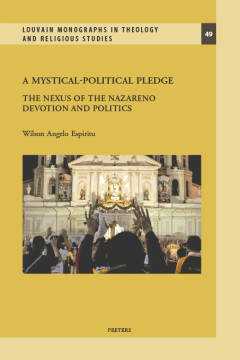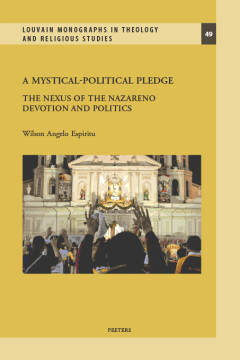
Bedankt voor het vertrouwen het afgelopen jaar! Om jou te bedanken bieden we GRATIS verzending (in België) aan op alles gedurende de hele maand januari.
- Afhalen na 1 uur in een winkel met voorraad
- In januari gratis thuislevering in België
- Ruim aanbod met 7 miljoen producten
Bedankt voor het vertrouwen het afgelopen jaar! Om jou te bedanken bieden we GRATIS verzending (in België) aan op alles gedurende de hele maand januari.
- Afhalen na 1 uur in een winkel met voorraad
- In januari gratis thuislevering in België
- Ruim aanbod met 7 miljoen producten
Zoeken
€ 115,45
+ 230 punten
Omschrijving
This book explores the potential for the devotional panata (pledge) accorded to the Nazareno of Quiapo, Manila to underscore the inextricable relationship between the mystical and the political dimensions of the Christian faith. Espiritu puts forward a theological model that rejects overemphasis on the panata's mystical quality in favor of a balanced appreciation for its political as well as mystical implications. The central contention is that understanding the panata as "a mystical-political pledge" provides a basis for realizing the political potential of this practice vis-a-vis its mystical character. Should this enriched understanding of the panata reinforce the conscientious political engagement of millions of Nazareno devotees, then this popular devotion would manifest as an effective vehicle for the liberative and transformative grace of Christ in today's Philippine society.
Specificaties
Betrokkenen
- Auteur(s):
- Uitgeverij:
Inhoud
- Aantal bladzijden:
- 381
- Taal:
- Engels
- Reeks:
- Reeksnummer:
- nr. 49
Eigenschappen
- Productcode (EAN):
- 9789042952966
- Verschijningsdatum:
- 31/05/2024
- Uitvoering:
- Paperback
- Formaat:
- Trade paperback (VS)
- Afmetingen:
- 160 mm x 240 mm
- Gewicht:
- 539 g

Alleen bij Standaard Boekhandel
+ 230 punten op je klantenkaart van Standaard Boekhandel
Beoordelingen
We publiceren alleen reviews die voldoen aan de voorwaarden voor reviews. Bekijk onze voorwaarden voor reviews.









